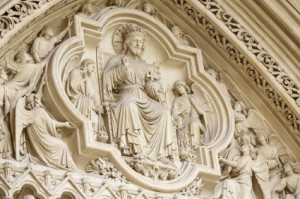 Authority, not power, is the primary means by which earthly rulers rule. Confusion arises because the terms power and authority are often used interchangeably, when they are in fact two very different things. Power is brute force. Power is physically enforcing one’s will on another person or thing. When an army overtakes a city it does so by power. When a boxer defeats another boxer in the ring, he does so by power. Earthly rulers, however, do not rule primarily by power, but by authority.
Authority, not power, is the primary means by which earthly rulers rule. Confusion arises because the terms power and authority are often used interchangeably, when they are in fact two very different things. Power is brute force. Power is physically enforcing one’s will on another person or thing. When an army overtakes a city it does so by power. When a boxer defeats another boxer in the ring, he does so by power. Earthly rulers, however, do not rule primarily by power, but by authority.
Think about your own life, if you are like most people you have lived a law-abiding life even though you have never been compelled by force to do so. You arrive at work by a certain time each day, not because someone physically forces you to but because someone with authority at work, your supervisor or the owner, told you to do so. You obey the parking lot attendant when he directs you to the right instead of the left, not because he forces you to but because he has authority over the parking lot.
When earthly kings rule they do so by delegating authority to subordinates, who delegate that authority to their subordinates, thereby lengthening the reach of the will of the king. A king appoints a minister of defense and gives him authority over the military forces of the country. The military forces must then obey the minister of defense as they would the king. And so it goes for each department under the king.
Delegated authority has one very important condition: delegated authority only extends the rule of the king if those to whom the king delegates authority are obedient to the king. A minister of defense who initiates a war contrary to the instructions of the king has not extended the rule of the king, but his own. Implicit in the delegation of authority is the condition that that authority will be used to carry out the will of the king. To the extent the subordinate uses that authority to do his own will, he has perpetrated a fraud, representing to the world by his office that he is promoting the will of the king when he is promoting his own.
These same principles apply in the kingdom of God. Jesus also rules (though not exclusively) through delegated authority. Just before Jesus ascended into heaven He reminded His disciples, “All authority has been given to Me in heaven and on earth.” Matthew 28:18. Jesus’ words confirm He has been given all the authority necessary to rule and fulfill His role as King of the kingdom of God. But as a general rule, that authority is only exercised on the earth when those under Jesus’ delegated authority act in obedience to Him.
Think about this: The Book of Hebrews says that after Jesus ascended into heaven “…He…sat down at the right hand of God, waiting from that time onward until His enemies be made a footstool for His feet.” Hebrews 10:12-13. In I Corinthians the Apostle Paul makes a similar statement saying of Jesus that “…He must reign until He has put all His enemies under His feet.” I Cor. 15:25. Here’s the question: How can Jesus reign at the same time that He is waiting? And how can Jesus put His enemies under His feet if He is in heaven? The answer: By means of delegated authority. Jesus is waiting, just as an earthly king waits after delegating the authority to subordinates, for His people to carry out his instructions on earth.
Jesus puts His enemies on earth under His feet in the same way an earthly king overcomes his kingdom’s enemies—by delegating authority to others to accomplish His will. Not only has He chosen to do so, but He has chosen gladly to do so. Luke 12:32.
 Psalm 22 is a well-known messianic Psalm: v1 (“My God, my God was hast Thou forsaken me?”); v.16 (“They pierced my hands and my feet.”); v. 17 (“I can count all my bones.”); v18 (“And for my clothing they cast lots.”). But as often as these verses are cited and discussed, the prophetic verses in the later half of the psalm are ignored. Here are the verses to which I am referring:
Psalm 22 is a well-known messianic Psalm: v1 (“My God, my God was hast Thou forsaken me?”); v.16 (“They pierced my hands and my feet.”); v. 17 (“I can count all my bones.”); v18 (“And for my clothing they cast lots.”). But as often as these verses are cited and discussed, the prophetic verses in the later half of the psalm are ignored. Here are the verses to which I am referring:



